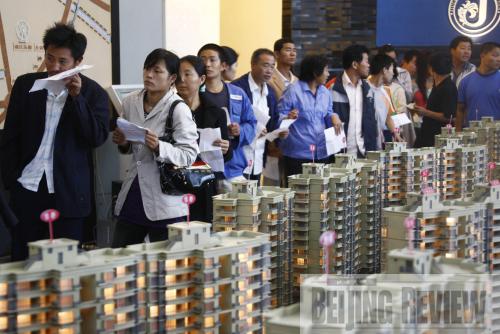|
 |
|
PEI XIN CONSUMER CONFIDENCE: Despite real estate price hikes, Shanghai residents queue to purchase houses |
Even with an upturn in the Chinese economy, many economists still hold doubts. The consensus among those who took part in the Sohu Economist Forum, held in Beijing on July 24, 2009, was to remain "vigilant against bubbles."
After the global financial crisis in 2008, China quickly adopted easy monetary policies and pro-active fiscal policies, while launching a stimulus package of 4 trillion yuan ($586 billion). Through these timely efforts, the Chinese economy increased 7.9 percent in the second quarter this year, just 0.1 percentage point lower than the 8-percent growth of annual target.
As the economy improves, the stock and real estate markets seem to rise suspiciously, causing economists to worry about possible bubbles.
The Chinese stock market has been growing steadily since the beginning of this year, with high expectations surrounding the market's anticipated value. Among the 13 categories in the MSCI China Index compiled by Morgan Stanley Capital International, 10 categories have price earnings ratios higher than the long-term average price earnings ratio.
In June, more than 1.6 million stock transaction accounts were opened, surging 68 percent compared with the same period last year, as individual investors poured into the stock market. The current aggregate market value of China's Shanghai and Shenzhen stock exchanges has surpassed that of Japan, allowing China's stock market to secure its place as the second-largest financial playing field in the world.
The real estate market of China is following the same brisk pace, and the financial crisis seems to have no influence on the industry that had experienced high growth. In June this year, prices of newly built commercial houses in 36 large and medium-sized Chinese cities increased 6.3 percent over a year ago. Moreover, as the auction prices of land hit record highs, housing prices portend to increase rapidly. The real estate market was in a so-called bubble in June 2008, at which point the Chinese Government adopted various measures to cool the market.
Large credit worries
The excessive growth of banking credit may be responsible for the rise of the stock and real estate markets, said Zhang Liqing, President of the School of Finance of the Central University of Economics and Finance.
In the first half of 2009, the newly added credit in China reached 7.37 trillion yuan ($1.08 trillion), surpassing the amount granted in any year since the People's Republic of China was founded in 1949, according to figures released by the National Bureau of Statistics (NBS). At the outset of 2009, the initial goal set by the state for the whole year was just 5 trillion yuan ($732.06 billion).
| 